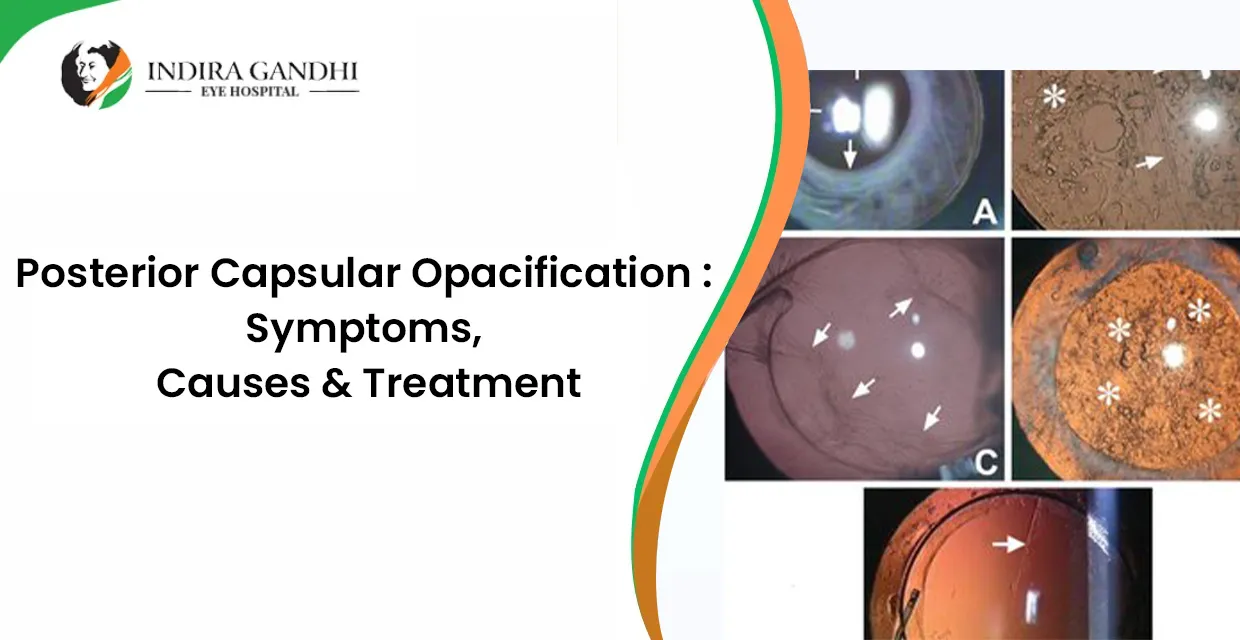Posterior Capsular Opacification (PCO) may sound intricate, but grasping its fundamentals is crucial for those who have undergone cataract surgery or are considering it. In this blog, we will explore the realm of PCO, covering its causes, symptoms, treatment options, surgical techniques, and post-operative care, providing a comprehensive guide for a thorough understanding of this condition.
What is PCO?
Posterior Capsular Opacification, commonly known as PCO or secondary cataract, is an eye condition that can arise after cataract surgery. To comprehend PCO, let's first understand cataract surgery itself. During this procedure, the cloudy lens (cataract) is delicately removed and replaced with an artificial intraocular lens (IOL) to restore clear vision. However, post surgery, the posterior capsule, a thin, transparent membrane behind the IOL, can become cloudy over time due to the constant growth of cells around it, resulting in impaired vision.
Symptoms of Posterior Capsular Opacification
Early detection is crucial for prompt treatment. The main symptoms include:
Gradual Decline in Vision Clarity: Blurriness and a gradual decline in vision clarity post-cataract surgery.
Increased Sensitivity to Glare: Difficulty in bright conditions due to light scattering caused by cloudiness in the posterior capsule.
Difficulty Seeing in Low-light Conditions: Impaired night vision affecting daily activities in low-light environments.
Changes in Color Perception: Shifts in color perception, making colours appear less vibrant.
Halos Around Lights: Commonly noticed around headlights or streetlights in low-light conditions.
Causes of Posterior Capsular Opacification
Understanding the causes is crucial:
Residual Lens Cell Proliferation: Growth of residual lens cells on the posterior capsule after cataract surgery.
Age-related Factors: Aging increases the likelihood of cloudiness in the posterior capsule.
Pre-existing Medical Conditions: Conditions like diabetes or ocular disorders can amplify the risk.
Treatment Options for Posterior Capsular Opacification
Thankfully, PCO is treatable. The primary method is YAG laser capsulotomy, a non-invasive procedure creating a small opening in the cloudy capsule. Surgical capsulotomy is an alternative in specific situations.
Post-operative Care for Posterior Capsular Opacification
After treatment, proper care is essential:
Use Prescribed Eye Drops: Follow the prescribed drops to prevent infection and reduce inflammation.
Rest and Avoid Strain: Give your eyes adequate rest and avoid straining activities.
Attend Follow-up Appointments: Regular follow-ups are essential for monitoring recovery.
Report Any Unusual Symptoms: Report any severe or unusual symptoms promptly.
Protect Your Eyes: Wear sunglasses to shield eyes from sunlight and dust.
Emerging Technologies in PCO Eye Treatment
Advancements include drug-eluting intraocular lenses and pharmacological interventions to prevent or reduce PCO occurrence.
Risk Factors for a Secondary Cataract
PCO risk factors include natural healing after surgery, age, pre-existing medical conditions, and certain surgical techniques.
Conclusion
Understanding PCO is crucial for those undergoing or planning cataract surgery, especially in a renowned facility like the Indira Gandhi Eye Hospital & Research Centre, recognised as one of the best eye hospitals in India. Recognising symptoms, causes, and available treatments empowers individuals to make informed decisions about their eye health, ensuring they receive top-notch care during procedures such as cataract surgery in India.
The collaboration between patients and ophthalmologists, along with proactive post-operative care, guides individuals toward optimal eye health and clearer vision. If you encounter any eye issues, feel free to reach out to the Indira Gandhi Eye Hospital & Research Centre, providing comprehensive eye care services with a reputation for excellence as the best eye hospital in India.


